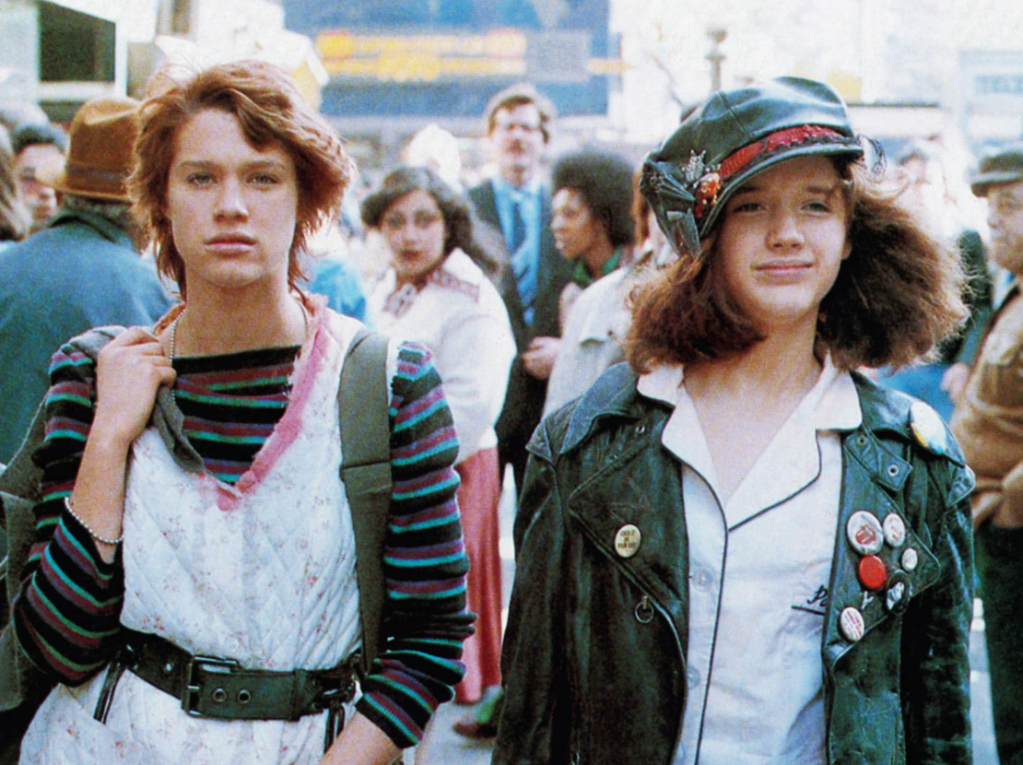Do friendships ever burn as brightly as they do in childhood? Times Square (1980) is a loving, though ultimately ineffective, movie-length tribute to the kind of intensity youth is so good at encouraging. The burning-bright friendship in this New York City-set movie is between objectively polar-opposite teenagers. One is Nicky (Robin Johnson), street-tough, living on her own, and dreaming of punk-rock stardom buoyed by the always-blasting boombox she lugs around like a vibrating blankie. The other is Pamela (Trini Alvarado), the cloistered, shy daughter of a politician. Her self-consciousness is so crippling that when she calls a local radio show host (Tim Curry) for advice, she signs her letter with “a real zombie.” (Her sole outlet to relieve the pains of her debilitating inwardness is the poetry she scribbles in her notebook.)
Happenstance is the only way these worlds-apart girls could meet. In Times Square, they’re assigned the same room in a psychiatric hospital where they’re unwillingly dropped off. Their affection for each other is pretty immediate. Nicky is taken with Pamela’s poetic eye. Pamela is quietly thrilled watching Nicky dauntlessly tear down the many adults who belittle her and knock over sympathy flowers like they were as much of an annoyance as a plume of gnats. But these girls don’t make that mutually obvious to each other until they’re rashly running away together, hopping into the front seats of a stolen ambulance and driving aimlessly until they get somewhere that isn’t here.
The first half hour of Times Square has an infectious youthful excitement; it evocatively recreates the almost-narcotic us-against-the-world feeling of an exhilarating new friendship. (Nicky and Pamela soon create their own little world in an abandoned Chelsea Piers warehouse they decamp to as a new shared home; the blood-sisters pact they make is basically their version of signing a lease.) But the film’s early assuredness dissipates as it expands outward into a feature-length movie. Nicky and Pamela’s bond, though notionally getting more intense, doesn’t believably deepen; their characters don’t develop beyond the initial stock types they’ve been shuttled into. (Though Johnson, for what it’s worth, gives a kind of magnetic-hellion performance making you instantly sad to learn her career might have taken off if not for a predatory contract.)
Eventually that aforementioned radio announcer, Johnny, catches wind that that “zombie” is actually a local politician’s missing daughter. He becomes an ally to her and her new friend, especially interested once they’ve announced the formation of a new punk duo called the Sleez Sisters. Johnny likes how their fed-up ethos grinds against Pamela’s uptight politician dad’s prim image obsessed with “cleaning up” the Times Square area; the girls further build on their bratty gimmick by running around town wickedly shoving TV sets off rooftops. But the pair’s musical aspirations are so insubstantially developed that they have an almost out-of-left-field feeling, made more jarring when the primary song the duo produces is rife with slurs in a Patti Smith-esque attempt at reclamation they actually have no business spearheading. The movie’s climax, which finds Nicky performing on a rooftop as a bunch of same-liknessed fans watch her agog, is deflating — feels unbelievable. How could music this terrible — and whose effect on the public hadn’t until just now been especially engaged with — inspire such frenzy?
Times Square wants to testify both to how friendship has a mutually uplifting quality and how music is a tirelessly invaluable tool to make life survivable. But it doesn’t arrive at the end of either ambition convincingly. You’re always much more aware of what Times Square is trying to do than you are moved by what it’s achieved.
